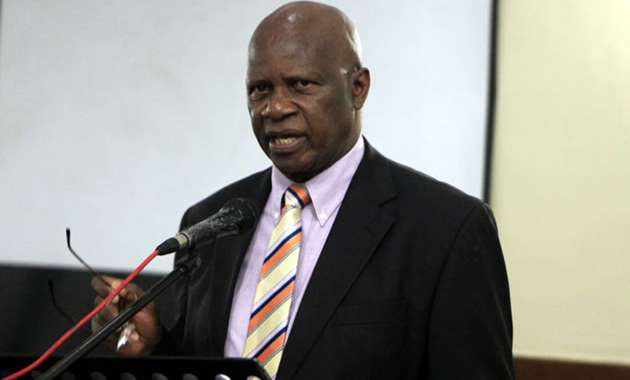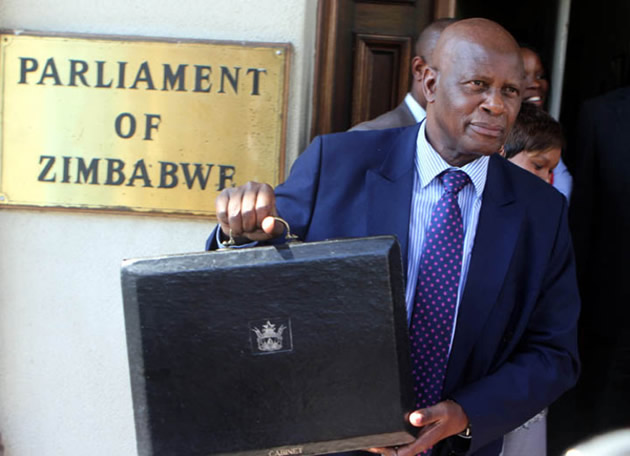Budget promotes FDI, savings

Happiness Zengeni and Golden Sibanda—
FINANCE and Economic Development Minister Patrick Chinamasa yesterday announced a pro-fiscal policy National Budget for 2016 which seeks to stimulate economic growth in the face of dwindling revenue inflows. While the budget was largely tax neutral, Minister Chinamasa unveiled a cocktail of fiscal policy initiatives which seek to increase production mainly across the key sectors of agriculture, mining and manufacturing.
The initiatives also seek to curb the importation of non-essential goods, preserve employment and create a savings culture. At the same time, the minister sought to promote inflows of cheap foreign lines of credit, attract foreign direct investment and boost confidence in the economy.
Related…………..
- All set for the Budget
- Editorial Comment: Chinamasa has his work cut out
- Govt targets to raise $3,85bn in 2016
- 2,7pc economic growth projected
- A Buy Zimbabwe word into the mid-term Budget
Minister Chinamasa stuck to the $4 billion budget as has been the case since dollarisation. Revenue projections for the year are forecast at $3,85 billion which will result in a deficit to be financed from domestic resources . He proposed measures to enhance revenue collection, provide relief to taxpayers, improve efficiency in tax administration as well as tighten border controls.
To cushion low-income households against high prices, Minister Chinamasa proposed to exempt from Value Added Tax, goods that include protective clothing, milk, eggs vegetables, fruits, rice, cereals and margarine with effect from January 2, 2016.
The minister also announced an increase in fines on traffic offences. “Some motorists, particularly, commuter omnibuses and mshika-mshika drivers continue to risk the lives of passengers and other motorists due to negligent driving.”
The most common offences committed on the road include, proceeding against red robots, overtaking against white solid lines, driving on the wrong side of the road, dropping passengers at undesignated points and failing to stop when instructed to do so by the police, among others.
Highlights . . .
- Economy projected to grow 1.5 percent in 2015 backed by tourism, construction and communication.
- In 2016, GDP growth projected to rebound to 2.7 percent buoyed by mining, tourism, construction and the financial sector.
- Agriculture expected to recover by 1.8 percent.
- Inflation expected to end the year at -2.3 percent after reaching -3.3 percent in October. Forecast for 2016 is -1.6 percent.
- In 2015, exports projected at $3.4 billion against imports of $6.3 billion, giving a trade deficit of $2.9 billion.
- Rebate of duty on capital equipment imported by mining, agriculture, manufacturing and energy sectors, for equipment valued at $1 million and above, with effect from 1 January 2016. Capital equipment imported under the facility not liable to Customs Duty and VAT.
- Reduced royalty rate of 3 percent on incremental output of gold using previous year’s production as a bas year.
- Exempt from tax interest earned on deposits with tenure of more than 12 months from 1 January 2016.
- In order to provide relief to retrenched employees who have not yet attained the prescribed retirement age,proposed to exempt a minimum value of $10 000 or one third of the total value of the pension or annuity up to a maximum of $60 000 with effect from 1 January 2016
- · The travellers’ rebate duty free allowance reviewed to $200 per calendar month from $300 from 1 January 2016.
- · VAT exemption on protective clothing, milk, eggs, vegetables, fruits, rice, cereals and margarine, with effect from 1 January 2016.
- · Reduce tobacco levy from 1.5 percent to 0.75 percent from 1 January 2016
- · Zero rating of soya bean for the period 1 February 2009 to 31 July 2012.
- · Provide for set off of any tax refunds against tax liabilities assessed on other tax heads through amendment of the Income Tax, Capital Gains, Customs & Excise and the Revenue Authority Acts with effect from 01 January 2016
- · Proposed that consignments transported on behalf of third parties be cleared under commercial importations as opposed to private importations, with effect from 1 January 2016.
- · Proposed to extend Advance Passenger and Cargo Manifest to road and rail transport carriers.
- · ZIMRA will, thus, be required to implement the green route concept at all border posts in order to ease congestion, with immediate effect.
- · Implementation of Single Window Facility by ZIMRA in the first quarter of 2016
- · Proposed to increase the cancellation fee from $10 to $50, in order to minimise duplicate entries into the ZIMRA ASYCUDA system, with effect from 1 January 2016.
- · Proposed to remove selected motor vehicles and buses imported by Government and School Development Associations from the Duty Free Certificate Facility, in order to facilitate implementation of the Cabinet Circular and also empower the local motor industry with effect from 01 January 2016
- · Proposed to increase duty on imported canopies and drop side panels from 10 percent to 40 percent, with effect from 1 January 2016
- · Proposed to introduce a manufacturer’s rebate to approved manufacturers for a period of two years, with effect from 1 January 2016.
“Whereas, road traffic fines are meant to be a deterrent for criminal behaviour, the current standard scale of fines which was last reviewed in 2009, does not however, promote safety and discipline on the roads. The traffic fines are also generally lower than those obtaining in the region.” Minister Chinamasa said as such, road traffic fines to begin from level 2 and end at level 4 of the standard scale of fines will be reviewed with effect from January 1, 2016.
Under the new fines, driving through red robots, overtaking against white solid lines, driving without a Driver’s Licence and not having a foot brake will attract $100 fines from $20 previously. “I, therefore, propose to review the level of road traffic fines to begin from level 2 and end at level 4 of the standard scale of fines, with effect from 1 January 2016.”
In terms of measures to stimulate productivity the minister extended a rebate of duty on capital equipment imported by mining, agriculture, manufacturing and energy sectors, for equipment valued at $1 million and above from 1 January 2016.
Earlier, Government had removed customs duty and also provided a valued added tax deferment facility on importation of industrial and capital equipment in support of industry retooling, but the VAT obligation had remained payable.
As such, Government intends to reduce cost of importing capital equipment for plant upgrades, refurbishment and new projects. To that end, all capital equipment imported under the facility will not be liable to Customs Duty and value added tax. This will positively impact on industrial productivity.
Also reflecting strong inclination of the 2016 budget towards agriculture, as the mainstay of the economy, the minister announced numerous measures to support the sector. Comprehensive measures have also been proposed to put more land under irrigation after the Government sealed multi-million dollar equipment deals with Belarus and Brazil.
To reverse decline in cotton farming, Government will support the resuscitation of cotton production by restructuring Cottco, including through the takeover of its $52 million debt, introducing finance schemes and better marketing among others.
Over and above the restructuring of Cottco, Government said it will give free inputs to cotton farmers for the next three seasons in order to encourage them to return to cotton production. On mining, the minister proposed to introduce a reduced royalty rate of 3 percent on incremental output of gold using the previous year’s production as a base year, with effect from 1 January 2016 in light of falling global metal prices.
Since incremental production will only be accounted for by the end of the following year, mines that qualify will benefit through tax credits to be used to pay future tax liability. The royalty rate for small miners was recently further reviewed down from 3 percent to 1 percent in September to curb leakages. To formalize illegal mining, marketing of minerals and advance the beneficiation agenda, Government will review selected fees and charges in consultation with the Ministry of Mines and Mining Development, the minister said.
Minister Chinamasa said the manufacturing sector is strategically positioned to promote value addition from commodity production to processing, branding, merchandising and distribution. He said several firms have benefitted from Government facilitated distressed and marginalized areas fund, which has enabled most beneficiaries to increase their capacity utilisation, revenues, employment, as well as exports.
As such, Government will continue to monitor performance of industries supported with fiscal interventions in 2014 to ensure such entities improve their competitiveness and graduate from assisted fragile firms to resilient industries. The minister said going forward, the successful resolution of Zimbabwe’s $1,8 billion external payment arrears is expected to disseminate positive signals to investors and lenders.
The successful implementation of these bold policy initiatives would also provide strong impetus to efforts geared at accelerating accumulation of capital, productivity and economic growth, building confidence and enhancing the country’s capacity to meet future external debt payments.
Reserve Bank governor Dr John Mangudya said the budget provides a clear road map for economic growth. “If we follow all the dictates of what the budget has said, we are in for a better environment for business,” said Dr Mangudya.











Comments